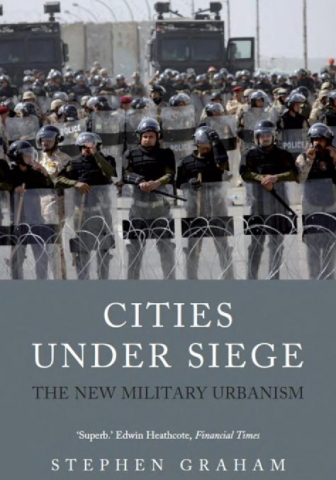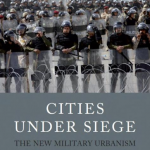polizeikongress 2024 kommt, jetzt schon mal was lesen

Buchempfehlung: `Cities Under Siege. The New Military Urbanism`, von Stephen Graham.
Einzelfälle ohne Ende in den Reihen der Sicherheitsbehörden, wenn es um aufgeflogene Prepper, Waffensammler, Todeslisten-Schreiber oder Nazis geht. Maschinenpistolen bei alltäglichen Einsätzen der Polizei. Steigende Gewalteskalation von Seiten der Bullen, Hinrichtungen im Wochenrhythmus durch die Polizei. Orchestriert wird das von einer zunehmend aggressiven Sprache der Politiker*innen und der Medien.
Der Kampf um die Stadt ist nicht nur in Berlin voll entbrannt und wir als Zuschauer*innen oft überrascht, wie schnell und widerspruchslos das Feindrecht die Stadtpolitik übernommen hat.
Stephen Graham hat beschrieben, wie die Militarisierung des Urbanen, Kolonialismus und Rassismus, mit der Propaganda gegen den inneren Feind verwoben ist. In seinem Buch `Cities Under Siege. The New Military Urbanism` beleuchtet er die negative Sicht der US Konservativen auf die urbane Gesellschaft, Militärdoktrinen der kriegsführenden Staaten, die Bedeutung von Grenzen, Zusammenhänge zwischen Tourismus, Unterhaltungsindustrie und Sicherheitsmanagement und vieles mehr. Anhand zahlreicher Quellen wird die Verbindung architektonischer Veränderungen der Städte mit der Angst der Mittel- und Oberschicht untersucht, was zu einem Boom des prison industrial complex führt.
Aus dem Buch:
„At the core of this books argument is the idea that new military ideologies of permanent and boundless war are redically intensifying the militarization of urban life. The process is far from mew: it simply adds contemporary twists to continual transformations – political, cultural and economic – which togehter seerve to normalize war itself as well as the preparations for war. Indeed, in many cases, the transformations associated with the new military urbanism merely extend and revivify the urban militarization, securitization, Manichaean thinking and fear-mongering. Michael Geyer defines it as the contradictory and tense social process in which civil society organizes itself for the production of violence. This invariably involves the the social construction of a conceptual division between the inside and the outside of a nation or other geographic area, and the orchestrated demonization of enemies and enemy places beyond the boundaries of inside.
US military theorist William Lind has argued that prosaic acts of immigration from the global South to the Norths cities must now be understood as acts of warfare. In „Fourth Generation war“, Lind writes, „invasion by immigration can be at least as dangerous as invasion by a state army.“ Lind argues that migrants within Western nations can now launch „a homegrown variety of Fourth Generation war, which is by far the most dangerous kind.“
(…)
Turning to our third key starting point – the new military urbanisms political economy – it is important to stress that the colonization of urban thinking and practise by militarized ideas of „security“ does not have a single source. In fact, it emanates from a complex range of sources. These encompass sprawling, transnational industriel complexes that stretch beyond the military and security sectors to span the technology, surveilance and entertainment industries; a wide range of consultants, research labs and corporate universities who sell security solutions as silver bullets to solve complex social problems; and a complex mass of security and military thinkers who now argue that war and political violence centre overwhelmingly on the everyday spaces and circuits of urban life.
Though vague and all-encompassing, ideas about security infect vertually all aspects of public policy and social lifes, so these emerging industrial-security complexes work together on the higly lucrative challenges of perpetually targeting everyday activities, spaces and behaviours in cities, as well as the conduits that link conurbations.
Cricially, the same constellations of security companies are often involved in selling, establishing and overseeing the techniques and practices of the new military urbanism in both war-zone and homeland cities. Often, as with the EUs new Europa-wide security policies, states or supranational blocks are not necessarily bringing in hight-tech and militarized means of tracking illegal immigrants because they are the best means to address their security concerns.
Domestic counterinsurgencies and internal colonial strategies invariably target the cosmopolitan urban districts in which diasporic communities and ethnic, post-colonial in-migrnats concentrate.“
Wer die Methoden der Feinde der Freiheit besser verstehen will, sollte dieses Buch gelesen haben. Jährliche Events wie der Berliner Polizeikongress sind nicht lediglich Propagandaveranstaltungen der Sponsoren; dort offenbaren sich auch strategische Konzepte eines Gegners, der sich immer selbst als kriegsführend versteht, das aber oft hinter variierenden Fassaden versteckt. `Cities Under Siege` liefert zudem einige Vorschläge für counterpolitics gegen ihre Sicherheitsstragien sowie reichlich Inspiration für weitere Angriffspunkte.
Das Buch gibts hier https://files.libcom.org/files/Graham,%20Stephen%20-%20Cities%20Under%20Siege.%20The%20New%20Military%20Urbanism_0.pdf


